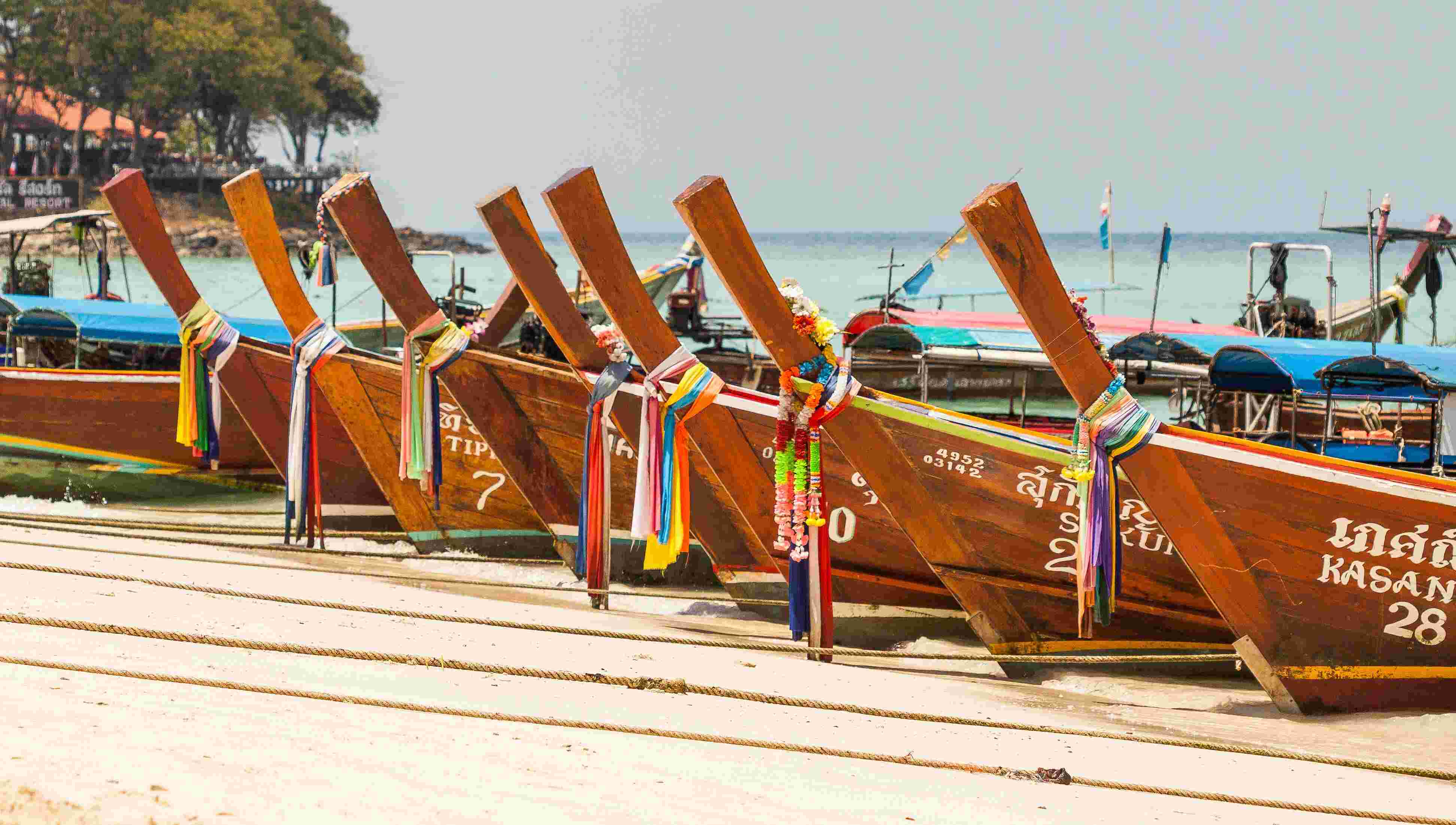Search results: 93
Thailand 2006

UNCTAD's Regional Course on Key issues on the International Economic Agenda for UNCTAD member States in the Asia and Pacific region will be held at the United Nations Economic and Social Commission for Asia and the Pacific in Bangkok, Thailand, November 13 - December 1, 2006.
The course is aimed at government officers (director or deputy-director level) in ministries of trade, industry or commerce, who are involved in the formulation and implementation of national trade and development policies. Academics from research institutions and universities active in international economic issues are also encouraged to apply.
The course draws on UNCTAD's perspectives and expertise, and aims to enhance an understanding of UNCTAD's analytical work, as well as the lessons drawn from UNCTAD's technical cooperation activities. The content and the approaches of the course will also draw on the competence and expertise of UNESCAP and other regional experts.
The interface between competition policy and MSME development

Micro, small and medium-sized enterprises (MSMEs) are vital contributors to economic development, employment generation, and innovation. However, they often face structural barriers when entering and operating in markets, including limited access to finance, information asymmetries, and unfair competitive practices. These challenges were further exacerbated by the COVID-19 pandemic, which led to the market exit of many MSMEs and disrupted supply chains globally.
Competition policy plays a crucial role in creating a level playing field for all market participants, including MSMEs. By ensuring open and fair markets, preventing anti-competitive conduct, and promoting pro-competitive regulations, competition policy can help unlock the potential of MSMEs as engines of growth and economic resilience. Moreover, interventions by governments, MSME agencies, and competition authorities during the pandemic—such as actions against price gouging, temporary allowances for cooperative arrangements, and financial support—have underscored the importance of coherent and balanced policy responses in times of crisis.
This course aims to equip officials from competition authorities, MSME development agencies, and other relevant stakeholders with tools and practical knowledge to better understand the interface between MSME development and competition policy. It will also support the design of strategies that promote the sustainable growth and resilience of MSMEs in a post-pandemic context.
This online course is complimentary courtesy of UNCTAD and will run from 2 June 2025 until 31 July 2025. The online course integrates self-paced learning with no specific login time.
The course is free and open to participants from UNCTAD member States. Candidates must be nominated by their governments. Interested individuals may also contact valentina.rivas@unctad.org and gouri.umesh@unctad.org to express their interest in participating.
Objectives
At the end of the course, participants will be able to:
- Enhance awareness of the relevance of Competition policy to MSMEs and how Competition policy can enhance MSMEs market access.
- Inform policy makers on how to integrate MSMEs and Competition policy into economic recovery plans.
- Raise awareness of how Competition and MSMEs policies are interlinked and can support the economy post-crisis.
- Strengthen the capacity of MSMEs to face challenges in the digital markets and promote advocacy initiatives.
- Understand the various barriers that affect access to finance by MSMEs.
- Understand the importance of inter-institutional cooperation for MSME growth and development.
Methodology
Your learning experience will take place in an online virtual learning environment in UNCTAD learning management system. You can log in at any time and at your convenience. Once online, you will be able to read the assigned texts, access digital learning resources and participate in the online activities.
Our learning model is built around three key characteristics: our courses are designed to be interactive, case-based and practical.
You will engage with various interactive online activities, and concepts will be brought to life through real-world competition law related cases that place you in the shoes of the regulators. As you and your peers discuss the challenges these regulators faced and debate solutions, you will learn vital competition law and policy concepts you can apply to your own career.
Our courses are also uniquely practical and based on real cases. To get the most out of the course, every participant must commit to teaching and learning from each other. Your cohort's diversity provides a unique opportunity for you to experience new perspectives and strengthen your own learning while helping others as well.
Contents
Module 1: Interlinkages between Competition Policy and MSMEs
Module 2: MSME challenges, Market Access and Market Positioning
Module 3: MSMEs and Access to Finance
Module 4: MSMEs and E-Commerce / Digitalisation
Module 5: Inter-agency / Institutional Collaboration
Target Audience
Government officials responsible for MSME, domestic trade and industry
Competition and MSME Development Agency Officials
Representatives of MSME organisations
Academicians
Civil society representatives
Prerequisites
There is no pre-requisite requirements to participate in this online course.
Cost participation
This online course is complimentary courtesy of UNCTAD. It is free and available to developing countries.
The Republic of North Macedonia 2021

The UNCTAD secretariat is pleased to announce that the next regional course on key issues on the international economic agenda, which is designed for countries with economies in transition, will be hosted by the Faculty of Economics, Saints Cyril and Methodius University of Skopje, with the support of the Ministry of Foreign Affairs of North Macedonia. The course will be held from 18 to 29 October 2021.
•To enhance understanding of the relationship between these areas and their link to country development strategies;
•To provide participants with knowledge and skills that will prepare them for trade negotiations, as well as to design and implement trade and development policies. These tools are designed to meet the needs and interests of their countries.
The syllabus will draw on the perspective of UNCTAD, its analytical work and lessons learned from its technical cooperation activities and will be enriched by the competence and expertise of representatives of the United Nations Economic Commission for Europe. Experts from North Macedonia will share national experiences in promoting and managing trade, investment, finance and development, among other topics.
The Republic of North Macedonia 2023

The UNCTAD secretariat is pleased to announce that the next regional course on key issues on the international economic agenda, which is designed for countries of Eastern Europe, will be hosted by the Faculty of Economics, Saints Cyril and Methodius University of Skopje, with the support of the Ministry of Foreign Affairs of North Macedonia. The course will be held from 3 to 14 July 2023. The course will focus on the links between trade, investment, finance and development, including in the context of international trade negotiations. Its aims are as follows:
•To enhance understanding of the relationship between these areas and their link to country development strategies;
•To provide participants with knowledge and skills that will prepare them for trade negotiations, as well as to design and implement trade and development policies. These tools are designed to meet the needs and interests of their countries.
The syllabus will draw on the perspective of UNCTAD, its analytical work and lessons learned from its technical cooperation activities and will be enriched by the competence and expertise of representatives of the United Nations Economic Commission for Europe. Experts from North Macedonia will share national experiences in promoting and managing trade, investment, finance and development, among other topics.
Trade and Gender Linkages with a Focus on E-commerce from a Gender Perspective (May - June 2023)

The course will run from 15 May to 18 June 2023.
The objective of the course is to provide participants with the knowledge needed to analyse the two-way relationship between trade and gender, and ultimately produce gender-aware policy recommendations. To this end, the course introduces the concepts of trade and gender, and combines theory on the interaction between trade and gender with empirical evidence. Upon completion of the course, participants will be able to achieve the following objectives:
- Look at the economy from a gender perspective
- Identify the channels through which trade affects women’s economic empowerment and well-being, and the channels through which gender inequality affects trade performance and competitiveness
- Illustrate how trade integration has influenced gender outcomes in the different economic sectors
- Identify the challenges and opportunities that e-commerce can provide to women-owned small enterprises
- Be familiar with the ongoing debate and rulemaking on trade and gender at the multilateral, regional and bilateral levels
- Use the knowledge acquired to produce policy-oriented research and strategies that could be used by national and regional policymakers, and academic papers investigating the interplay between trade and gender
Trade and Gender Linkages with a Focus on Non-Tariff Measures from a Gender Perspective (2024)

In this upcoming online course titled ' Trade and Gender linkages with focus on Non-Tariff Measures from a gender perspective', UNCTAD aims to equips participants with the knowledge to understand the impact of Non-Tariff Measures (NTMs) on women in the context of international trade and to formulate gender-equitable policies.
The objective of the course is to provide participants with the knowledge needed to analyse the two-way relationship between trade and gender, to understand the differentiated impacts of Non-Tariff Measures (NTMs) on women, and ultimately produce gender-aware policy recommendations. To this end, the course introduces the concepts of trade and gender and takes a close look at the challenges women face as a result of NTMs. It combines theory on the interaction between trade and gender with empirical evidence, and proposes policy and practical responses to address these issues.
Upon completion of the course, participants will be able to achieve the following objectives:
- Look at the economy from a gender perspective
- Identify the channels through which trade affects women’s economic empowerment and well-being, and the channels through which gender inequality affects trade performance and competitiveness
- Illustrate how trade integration has influenced gender outcomes in the different economic sectors
- Be familiar with the ongoing debate and rulemaking on trade and gender at the multilateral, regional and bilateral levels
- Understand NTMs and the gender-specific challenges associated with them
- Analyze the gendered impacts of NTMs in the context of the digital economy
- Be familiar with Voluntary Sustainability Standards and their role in women's economic empowerment in the agricultural sector
- Use the knowledge acquired to produce policy-oriented research and strategies that could be used by national and regional policymakers, and academic papers investigating the interplay between trade and gender
This online course on NTMs from a gender perspective aims to provide opportunities for participants to further enhance their knowledge and to build their professional networks through interactions via an online discussion platform.
The portfolio of teaching resources includes teaching modules focused on specific regions, or on selected topics of relevance for the analysis of the trade and gender nexus.








